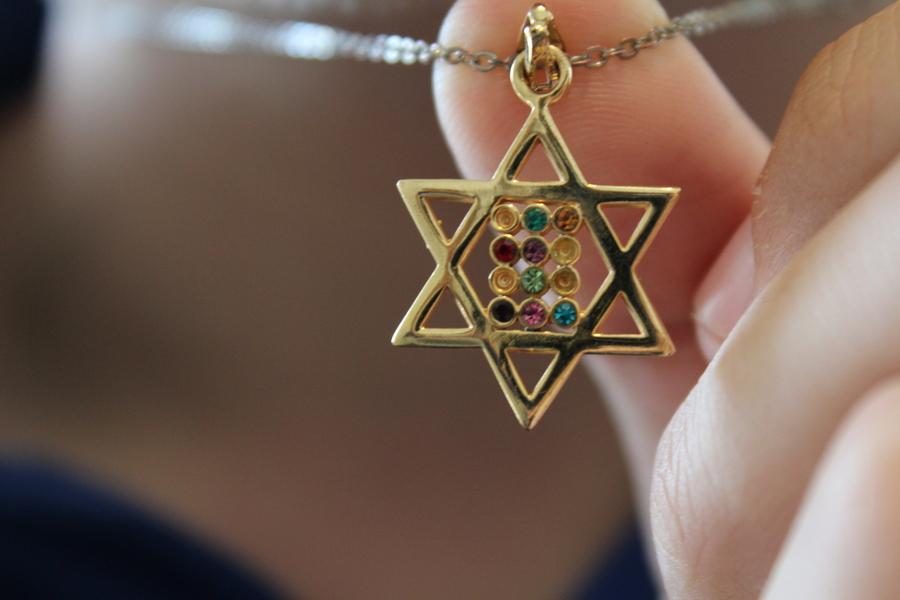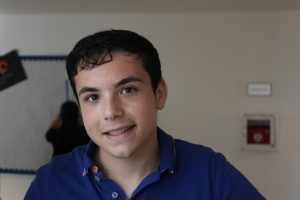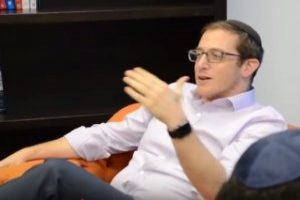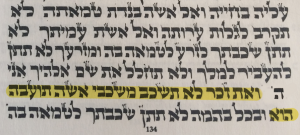Gay-Straight Alliance draws 15 at first meeting
IDENTITY: Micha Thau’s rainbow Magen David (star of David) necklace, which he wears everyday, represents two critical elements of his identity — Judaism and homosexuality. Micha co-founded Shalhevet’s first Gay-Straight Alliance earlier this year in the hopes of making any Shalhevet LGBT students feel comfortable and supported.
October 31, 2016
Less than two weeks after calling the Torah’s views on homosexuality the biggest challenge to emunah, or religious belief, of our time, Shalhevet’s first-ever Gay-Straight Alliance (GSA), created by head of school Rabbi Ari Segal, held its introductory meeting Sept. 27 in Room 309.
Led by school guidance counselor Rachel Hecht and Rabbi David Block, mashgiach ruchani or spiritual advisor, seven students and six teachers attended the meeting, which was held to show support for Shalhevet’s LGBT students.
Sophomore Nomi Willis, who was told last year by Principal Reb Noam Weissman that she could not wear her “legalize gay” t-shirt at school, was there.
“It’s important that Shahevet have a GSA because it’s in such a community where it might not be completely accepted to be gay,” said Nomi. “I want to be a part of making people feel comfortable and making it a main stream thing to support people who want to come out or just want to support gay rights.”
Announced at Town Hall Sept. 22 by Rabbi Segal, the club is geared towards teaching students how to be “allies” of LGBT students, according to Rachel Hecht and Shalhevet’s only openly gay student, Micha Thau, who helped form the club.
Because lunch period is divided this year and on Tuesdays, underclassmen’s and upperclassmen’s lunch period do not overlap, not all students were present at the same time and the meeting time may have been unclear to students.
“This is important enough that there should have been more attendance,” said Micha. “I think that we can do a better job of publicity. People didn’t really know what was happening or how it was happening.”
The club is a part of a larger effort by Shalhevet to provide support for LGBT students. Earlier this month, Rabbi Segal also signed a pledge he wrote with Micha, detailing more ways to solve what the head of school called the “the biggest challenge to emunah,” or religious belief, of our time.
In an Op-Ed published on this website, Rabbi Segal explained the challenges faced by LGBT Modern Orthodox Jews and said that more must be done to help.
“Young people in the LGBT community have told me that they feel invisible when we counsel them in private; they feel somewhat loved, but only unofficially, ‘tolerated,’ but not embraced,” Rabbi Segal wrote. “This state of limbo cannot persist.”
Micha, a senior, believes the GSA will help non-LGBT students be more tolerant.
“It’s about what it means to be an ally and what it means to be supportive,” said Micha. “It’s a very, very important skill to learn because people make a lot of mistakes.”
Micha declined to go into specifics, but said that he has heard many misconceptions about LGBT students at school.
“[There are] a lot of misconceptions about what it means to be a gay person,” said Micha. “It’s important that a lot of that stuff gets dispelled.
“People don’t exactly know what it means to be supportive, and I think this GSA will really give a clear definition of what it means to be an ally and how important that is.”
Micha acknowledged that LGBT students not yet “out” might be afraid to attend the meeting, and said he would not have gone himself before he came out as gay.
“Even though I know that I wouldn’t have gone, just knowing that there’s a group of students who cared enough to go would have made me feel a lot of safer,” said Micha. “I think it will land up doing a lot of good.”
In his Op-Ed, Rabbi Segal said it is now known that LGBT students, including many in Orthodox day schools, struggle painfully with fears that they would be rejected if people knew what their sexuality was. At the same time, their peers struggle with a disconnect between what Judaism says and the love and acceptance they feel for their friends.
“The reconciliation of the Torah’s discussion of homosexuality represents the single most formidable religious challenge for our young people today,” Rabbi Segal wrote. “More young people are ‘coming out’ than ever before, and that repeatedly puts a face to this theological challenge.
“These weighty issues do not live in the abstract,” he continued. “They powerfully and emotionally impact genuine individuals living in our Orthodox community, with real life families and friends. What may seem like an interesting sociological debate in truth is creating crushing pain, anxiety, and general turmoil for people about whom we care deeply.”
While the plan for the GSA and details like the weekly meeting time have yet to be decided, Micha believes it will make a difference.
“I’m hoping that whatever direction this goes, it will be a positive force for change at our school,” said Micha.

















